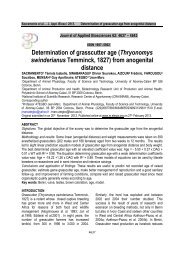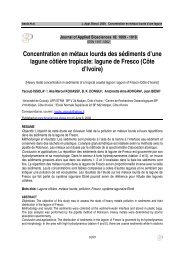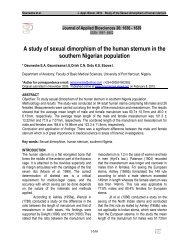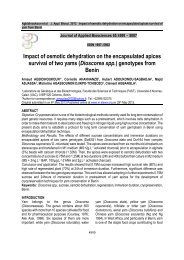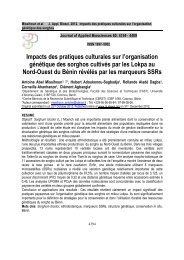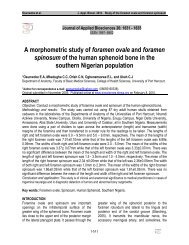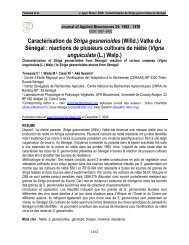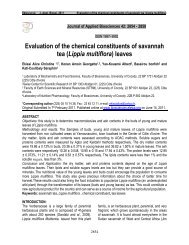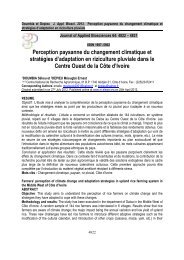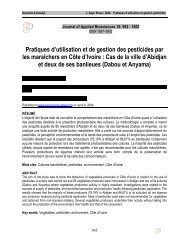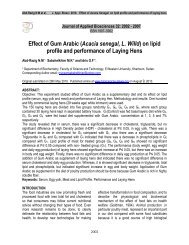Biofuels in Tanzania: Status, Opportunities and Challenges
Biofuels in Tanzania: Status, Opportunities and Challenges
Biofuels in Tanzania: Status, Opportunities and Challenges
Create successful ePaper yourself
Turn your PDF publications into a flip-book with our unique Google optimized e-Paper software.
Anthony M. Msh<strong>and</strong>ete.J. Appl. Biosci. 2011. <strong>Biofuels</strong> <strong>in</strong> <strong>Tanzania</strong>: <strong>Status</strong>, <strong>Opportunities</strong> <strong>and</strong> challenges<strong>in</strong> tropical forest areas <strong>and</strong> other high biodiversityhotspots, or are displac<strong>in</strong>g other activities such ascattle ranch<strong>in</strong>g <strong>in</strong>to these areas (Action Aid, 2010).In <strong>Tanzania</strong> impact on forests <strong>and</strong> biodiversity forbiofuel crop production is one of a major concern asbiofuel plantations are set up <strong>in</strong> <strong>Tanzania</strong>. This ismanifested by clear<strong>in</strong>g of large areas of natural forestshabitats such as miombo woodl<strong>and</strong>s <strong>and</strong> coastalforests to give way to biofuels crop farm<strong>in</strong>g (WWF-<strong>Tanzania</strong>, 2009). As new crops are <strong>in</strong>troduced <strong>and</strong>used as feedstocks the effects of these on native fauna<strong>and</strong> flora is uncerta<strong>in</strong>, some may turn to be aggressive<strong>in</strong>vasive species that may affect neighbor<strong>in</strong>g l<strong>and</strong>(Caniëls & Romijn, 2009; Sulle, 2009b,WWF-<strong>Tanzania</strong>,2009). The prospect of <strong>in</strong>dustrial, mono crop agriculturenowadays also raises the prospect of geneticallymodified (GM) crops. Introduction of GM crops is yetanother risk <strong>in</strong> <strong>Tanzania</strong> <strong>and</strong> elsewhere. GM crops arebe<strong>in</strong>g developed to <strong>in</strong>crease energy crops yield to meetbiofuel dem<strong>and</strong> <strong>and</strong> reduce the need for pesticides.This may result to cross-poll<strong>in</strong>ation with wild relatives<strong>and</strong> thereby affect<strong>in</strong>g biodiversity (Envirocare, 2007).Globally agriculture accounts for 70% of water use <strong>and</strong>90% of use <strong>in</strong> develop<strong>in</strong>g countries such <strong>Tanzania</strong>.Water is a scarce resource <strong>in</strong> many parts of <strong>Tanzania</strong>.In a study of three Sub-Saharan African countries,Rosen & V<strong>in</strong>cent (1999) found that women spend, onaverage, more time than men on water provision: 700hours a year <strong>in</strong> Ghana, 500 hours/year <strong>in</strong> <strong>Tanzania</strong> <strong>and</strong>200 hours/year <strong>in</strong> Zambia; women also tend to collecthigher volumes of water compared to men. Water usedfor biofuels could limit the amount of water available fordomestic uses <strong>and</strong> for other l<strong>and</strong> uses such as foodcrops <strong>and</strong> deplete the local water table. There is alsorisk of large-scale irrigation to cause sal<strong>in</strong>isalation. Thisis likely to occur <strong>in</strong> irrigated areas, which have lowra<strong>in</strong>fall as well as <strong>in</strong> coastal areas due to reduced watertable (WWF-<strong>Tanzania</strong>, 2009). Many biofuels projects <strong>in</strong><strong>Tanzania</strong> are planned for both dry <strong>and</strong> coastal areas(Kamanga, 2008; Sulle & Nelson, 2009a). It therefore,likely that sal<strong>in</strong>isalation could have a large potentialeffect to the water supply <strong>and</strong> fertility.The process<strong>in</strong>g of biofuels can also consumesubstantial quantities of water, thus the ability toprovide more for biofuel crop production <strong>and</strong>process<strong>in</strong>g of biofuels requires careful analysis at local<strong>and</strong> regional scales. Due to the current status of biofuelproduction <strong>in</strong> <strong>Tanzania</strong>, discharge of effluent fromprocess<strong>in</strong>g biofuels is of low priority than the otherissues l<strong>in</strong>ked to biofuels <strong>in</strong> <strong>Tanzania</strong>. However,regulation <strong>and</strong> control of effluents to mitigate negativeenvironmental impacts should be taken (WWF-<strong>Tanzania</strong>, 2009). Indirect l<strong>and</strong> use change occurs whenone form of l<strong>and</strong> use is displaced to another area <strong>and</strong>for a viable biofuels <strong>in</strong>dustry, the l<strong>and</strong> must also becapable of support<strong>in</strong>g sufficiently high crop yields forproduction to be economic (UNESCO, SCOPE &UNEP, 2009). In <strong>Tanzania</strong> some of the currentproposed biofuel production plantations pose a largethreat to biodiversity as they plan to employ large workforce, which will need houses to be built after clear<strong>in</strong>gnatural habitats. A casual laborer will have an impacton surround<strong>in</strong>g areas <strong>and</strong> forest reserve as they couldbe <strong>in</strong>volved <strong>in</strong> logg<strong>in</strong>g, charcoal production etc whenemployment <strong>in</strong> plantations is not available (WWF-<strong>Tanzania</strong>, 2009). Pleas have been made at the<strong>in</strong>ternational level that rules govern<strong>in</strong>g the <strong>in</strong>ternationalliquid biofuels market should be agreed on <strong>and</strong>adopted, <strong>and</strong> the social <strong>and</strong> environmentalsusta<strong>in</strong>ability of biofuels production should be ensured.Establish<strong>in</strong>g one or more of the follow<strong>in</strong>g could do this:codes of conduct, voluntary schemes, certification,bilateral agreements <strong>and</strong> multilateral frameworks (UN,2007). A number of national <strong>and</strong> <strong>in</strong>ternational <strong>in</strong>itiativesaimed at ensur<strong>in</strong>g the susta<strong>in</strong>ability of biofuelsproduction <strong>and</strong> process<strong>in</strong>g are already underway, suchas the International Bioenergy Platform (IBEP) <strong>and</strong> theGlobal Bioenergy Partnership (GBEP), both housedwith<strong>in</strong> FAO, <strong>and</strong> the Roundtable on susta<strong>in</strong>able biofuels(GBEP, 2007).Research <strong>and</strong> development on biofuels: There isemerg<strong>in</strong>g global opportunity for producers of biofuels.<strong>Tanzania</strong> can benefit if it chooses to engage <strong>in</strong> thisopportunity align<strong>in</strong>g <strong>in</strong>dustry susta<strong>in</strong>ability <strong>and</strong>development goals via research <strong>and</strong> development(R&D). R&D on biofuels to generate advanced <strong>and</strong>cost-effective bioconversion technologies is the firststep <strong>in</strong> large-scale promotion of biofuels technologies <strong>in</strong>any country <strong>in</strong> the world. More research <strong>and</strong> <strong>in</strong>vestmentis required to develop the potential of small-scalebiofuel production aimed at meet<strong>in</strong>g the energy needsof people liv<strong>in</strong>g <strong>in</strong> <strong>Tanzania</strong>. Traditionally, both public<strong>and</strong> private universities should conduct basic <strong>and</strong>applied research, process development, providesexpert professional services to <strong>in</strong>dustry, government<strong>and</strong> other organizations.With regard to biofuels there has been scientificresearch go<strong>in</strong>g <strong>in</strong> <strong>Tanzania</strong>. Biogas a gaseous biofuelproduced by anaerobic digestion of almost all organicmatter (with no competition for l<strong>and</strong>, food, water etc). Itis a promis<strong>in</strong>g, affordable, decentralized renewable2694



